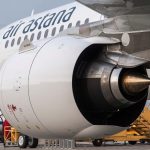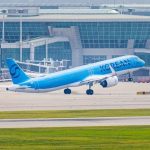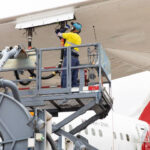GenZero, a green investment platform of the Singapore government, has partnered with the World Economic Forum to establish Green Fuel Forward, an initiative to help increase demand for sustainable aviation fuel across the Asia-Pacific region. GenZero is part of Temasek, the government’s global investment vehicle, the portfolio of which includes a controlling 53% shareholding in Singapore Airlines, and stakes in multiple major finance and technology businesses. Founding members of Green Fuel Forward include major airlines, aerospace manufacturers, logistics providers, technology companies and financial groups including Temasek itself and several of its portfolio businesses, which have committed to collaborate in scaling SAF production through programmes such as book-and-claim and managing key issues including environmental integrity and reporting practices.
“The Asia-Pacific region has a unique opportunity to lead in sustainable aviation fuels,” said GenZero CEO Frederick Teo, “but unlocking this potential requires stronger demand signals. Green Fuel Forward can provide the technical clarity and corporate commitment needed to scale SAF adoption by bringing together key industry players to drive the market forward.”
“We are thrilled to expand our aviation decarbonisation efforts by creating a targeted programme to unlock Asia-Pacific’s immense potential,” added Laia Barbarà, the World Economic Forum’s Head of Climate Strategy. “Green Fuel Forward will complement our well-established and ongoing Airports of Tomorrow and First Movers Coalition activities, increasing knowledge sharing, empowering organisations to procure SAF, and creating additional networking opportunities for our local partners and stakeholders.”
The Asia-Pacific region is the world’s largest collective market for air transport, and one of the slowest adopters of SAF. But its support for the fuel is growing with Singapore and Japan confirming SAF blending mandates, Australia announcing policies to support SAF development, and production either underway or proposed in those countries and others including China, Malaysia, Thailand, India and the Pacific island nation of Fiji. Singapore is also the location of the world’s largest capacity SAF production facility, operated by Finnish renewable fuels group Neste.
Recently, a high-level study jointly conducted by the Association of Southeast Asian Nations (ASEAN), the Canadian government, Boeing and global professional services collective GHD, concluded that plentiful supplies of agricultural feedstock available across Southeast Asia could enable the region to become a major global supplier of SAF. As well, late last year, the Asia Sustainable Aviation Fuel Association (ASAFA) was launched in Singapore to help increase production and use of low carbon aviation fuels across the region.
Green Fuel Forward was announced during the GenZero Climate Summit 2025, which has just been held in Singapore. Founding members of the group include Temasek, Singapore Airlines, Air New Zealand, American Express Global Business Travel, Boeing, Chooose, Singapore-based carbon credit facilitator Climate Impact X, Singaporean banks DBS and UOB, global logistics group DHL, International Energy Agency, Japanese bank Mizuho, Neste, Qantas Group, Roundtable on Sustainable Biomaterials and shipping operator Berge Bulk.
“As an asset owner, we support our portfolio companies to achieve real-world decarbonisation,” said Kyung Ah-Park, Temasek’s Chief Sustainability Officer. “We seek opportunities to leverage our networks and ecosystem partners to facilitate industry-wide climate transition.
“SAF is crucial for accelerating decarbonisation of the hard-to-abate aviation sector, yet it makes up less than 1% of global aviation fuel today. High-integrity SAFc – SAF certificates purchased through book-and-claim programmes – can help bridge the financing gap and catalyse demand for SAF, which will help reduce the green premium and support the scaling of SAF.”
Lee Wen Fen, Chief Sustainability Officer and SVP Corporate Planning for Singapore Airlines, said scaling SAF in the Asia-Pacific region required not just ambition but also collaboration. “Singapore Airlines is joining the Green Fuel Forward initiative as this is a useful platform to unite airlines and corporates in building shared demand while also fostering mutual understanding of SAF pathways and opportunities. This will help to educate and empower a broader ecosystem of like-minded partners who are committed to decarbonising aviation,” she explained.
Fiona Messent, Chief Sustainability Officer for the Qantas Group, said Green Fuel Forward was both a significant initiative to help increase awareness and demand across the Asia-Pacific region, and supported her company’s own investments in developing and using SAF. Qantas has long been a strong advocate of SAF production in its home market, jointly investing in an evolving alcohol-to-jet fuel plant in Queensland, backing local feedstock production programmes and, with Airbus, providing seed capital for start-up companies developing new SAF technologies.
“As a leader in Australia’s transition to lower-emissions aviation, we’re proud to work with our Green Fuel Forward partners to drive wider adoption and send a clear signal that there is strong and growing demand for sustainable fuels,” she said.
“With its abundant feedstock opportunities and increasingly supportive policy measures to advance SAF, the Asia-Pacific region has a pivotal role to play in creating a more resilient global aviation industry,” added Robert Boyd, Boeing’s Regional Director of Asia Pacific Sustainability and Partnerships.
In addition to direct usage of SAF, the use of book-and-claim programmes was important to drive SAF production and use, said Oi-Ye Choo, CEO of Singapore-based Climate Impact X, a global provider of carbon credit solutions.
“A coordinated ecosystem is essential to move the needle on aviation’s net zero journey. As SAF scales, mechanisms like SAF certificates offer a credible near-term pathway for airlines and corporates to act now while catalysing the growth of future SAF supply.”
Investment is also crucial, added Helge Muenkel, Chief Sustainability Officer of Singapore’s DBS Bank. “Through this initiative, we aim to galvanise industry stakeholders, mobilise capital and shape pathways that will help scale SAF solutions across Asia-Pacific. Our participation reaffirms DBS’ commitment to enabling business transformation, as well as driving real-world impact and a just and inclusive transition for the region.”
It is not just aviation and allied businesses which are backing Green Fuel Forward. Berge Bulk, a Singapore-based shipping operator, is progressing plans to decarbonise its fleet of 90 owned or managed vessels. It is also exploring other ways to reduce its environmental impact.
“As a leading global shipowner, Berge Bulk understands the challenges involved in decarbonising the transport and logistics sector,” said the company’s CEO and Founder, James Marshall.
“While we work to rapidly reduce our own shipping emissions through efficiency, technology, new fuels and carbon capture, we are also looking for effective ways to address our Scope 3 emissions. This includes emissions from our business air travel.
“By joining the Green Fuel Forward alliance, we are committed to utilise sustainable aviation fuels and SAF certificates as part of our decarbonisation strategy.”
Meanwhile, Singapore Airlines Group has announced it is to buy both SAF and SAF certificates from Neste and World Energy respectively. The Group has acquired 1,000 tonnes of CORSIA-eligible neat SAF that was produced at Neste’s Singapore refinery, blended locally and uplifted at Changi Airport. This is the Group’s second purchase from the Neste refinery.
The Group has also purchased around 2,000 tonnes of CORSIA-eligible SAF in the form of emissions reductions from US producer World Energy using the Book & Claim Chain of Custody model, which allows the Group to claim associated emissions reductions without physical fuel delivery.
Both deals were completed in the first quarter of 2025 and projected to reduce more than 9,500 tonnes of CO2 emissions.
In a review of the region, the Association of Asia Pacific Airlines (AAPA) has warned the industry’s path to net zero emissions by 2050 is under threat due to a combination of slow deliveries of new aircraft, leading to a retention of older, less fuel efficient types, and the limited availability of SAF.
“In 2025, over one-fifth of aircraft deliveries are expected to be delayed as pandemic-induced supply chain disruptions remain unresolved, and there’s no clear path to any meaningful alleviation of these constraints,” said AAPA Director General Subhas Menon.
“Worryingly, very few traditional fuel suppliers have joined the SAF supply chain. Demand for SAF continues to outstrip supply and costs remain prohibitively high. Regulatory frameworks to encourage SAF production are still underdeveloped, inconsistent or insufficient.”
(This article was updated May 13 to include AAPA comments)
Photo: Singapore Airlines














More News & Features
LanzaJet and KMG agree to progress SAF production project in Kazakhstan
SkyNRG says e-SAF and carbon removals should not be competing strategies for aviation decarbonisation
South Korea announces mandatory SAF blending for departing international flights from 2027
Catagen launches SAF production company and signs offtakes with Ryanair and Shell
Australia announces A$1.1bn incentive scheme to drive local production of low carbon fuels including SAF
Oneworld airline partners join with Breakthrough Energy Ventures to invest in new SAF technologies